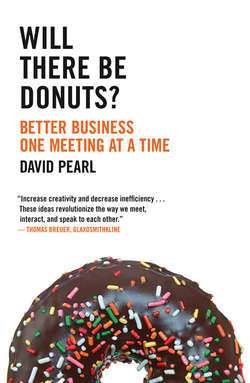Читать книгу Will there be Donuts?: Start a business revolution one meeting at a time - David Pearl - Страница 44
Really Meeting allows Real Conversations to happen
Оглавление“You don’t really want to have a war, do you, your Highness?”
It’s not a phrase that you or I might use too often. But it’s the sort of conversational gambit you might need at your fingertips if you happen to be the head of a global NGO like Oxfam. Dame Barbara Stocking is a fan of really meeting. She has to be when dealing with potentially explosive international situations.
There is a head of state I can think of who thinks the world is against him. He is constantly about to go to war with a neighboring state. So recently I got on a plane. The fact that I took the trouble to go out there and visit him was already an important step. Sometimes just showing up is the key. We had a very human discussion and in the middle of it I just asked him point-blank if he really intended to go to war. After quite a pause he replied. “No, I don’t want to do that.”
Nearly meeting skirts the dangerous issues. When you are really meeting, people say what they mean, mean what they say, and the conversations that need to happen take place.
This is a great example of what I call “taking the gorilla off the fridge.” Essentially, if there is a subject which should be talked about but isn’t, you severely compromise the quality of your meeting. Imagine having a gorilla on your fridge while you are having Sunday dinner. Everyone is carrying on as normal, but everyone knows things are far from OK. Some people call this having “an elephant in the room.” Different animal, equally debilitating effect. My advice is to refer to the un-talked-about beast right from the start. When you set up a meeting you can include a phrase like “I know some of you are thinking X …” or “If I were in your shoes, I know I’d be wondering about Y.”
You don’t have to go into detail, but just mentioning the unmentionable eases tension and creates the conditions where a real meeting can occur.
Thomas Breuer points to two other key factors when he talks about the importance of “a common language” and “a license to operate” in encouraging real conversations to happen. The in-depth work we have done with him and his organization showed how important it is that everyone has a common understanding of what a real conversation means and that they know they are mandated to have them with colleagues irrespective of their level in the hierarchy. Once you have achieved these two things, real conversations start to propagate through an organization like a healthy “virus.” “Let’s have a real conversation” becomes a common phrase that’s no more threatening than “Let’s have a coffee.” You’ve turned what was an exotic and rather threatening idea into a common currency.
Very few large organizations have really done that groundwork. So it’s often up to individuals—up to you—to start the ball rolling. As we’ll see later in the book, there are many reasons we might choose to back off from and miss the opportunity for really meeting. It requires some confidence in yourself and a real trust in the value of Real Conversation.
“It took a bit of nerve to ask him the war question” admits Dame Barbara, and she is, I can assure you, no wallflower. “But it was worth it to get the subject on the table. I really do believe that all people are equal, so at one level, I don’t care.”
What touches me about the story is that once you create human connection, really meeting another human being, anything is possible.
